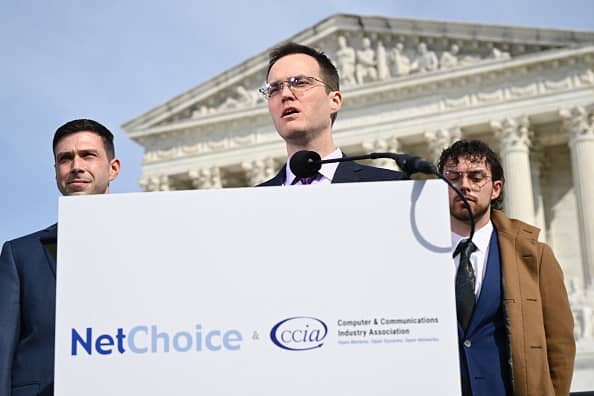
Chris Marchese (L), director of the NetChoice Litigation Center, looks on as Matt Schruers (C), president and CEO of the Computer & Communications Industry Association, speaks to reporters outside of the U.S. Supreme Court in Washington, D.C., on Feb. 26, 2024.
Andrew Caballero-Reynolds | AFP | Getty Images
The Supreme Court on Monday wiped existing rulings around two state laws that aim to prevent tech companies from banning users over potentially harmful rhetoric. The move prolongs a debate over whether Republicans will be able fight what they view as “censorship” by leading social media platforms.
The Court sent the issue back to lower courts for further review, arguing that the previous rulings failed to properly explore whether the content moderation laws would be unconstitutional under all circumstances.
Texas and Florida have passed legislation that Republican lawmakers claim will stop tech companies including Facebook parent Meta; X, formerly known as Twitter; and Google’s YouTube from stifling conservative opinions. The states argue the laws ensure all users have equal access to the platforms, while the tech companies, which are represented by groups including NetChoice, say they violate the companies’ free speech rights.
Justice Elena Kagan wrote the majority opinion, and no justices dissented. She wrote that the lower courts had previously argued how the laws would apply to the largest social media platforms such as Facebook, and in doing so, they failed to consider how it might affect “other kinds of websites and apps” such as Uber or Etsy.
“Today, we vacate both decisions for reasons separate from the First Amendment merits, because neither Court of Appeals properly considered the facial nature of NetChoice’s challenge,” Kagan wrote.
Texas and Florida introduced the laws in 2021 after former President Donald Trump was banned from Twitter because of inflammatory posts surrounding the results of the 2020 presidential election and the ensuing riot at the Capitol on Jan. 6, 2021. Trump is now the leading Republican candidate in the 2024 presidential race.
The laws in Texas and Florida were enacted before Tesla and SpaceX CEO Elon Musk acquired Twitter for about $44 billion in 2022. Musk allowed Trump to return to Twitter that November.
EMEA Tribune is not involved in this news article, it is taken from our partners and or from the News Agencies. Copyright and Credit go to the News Agencies, email news@emeatribune.com Follow our WhatsApp verified Channel





